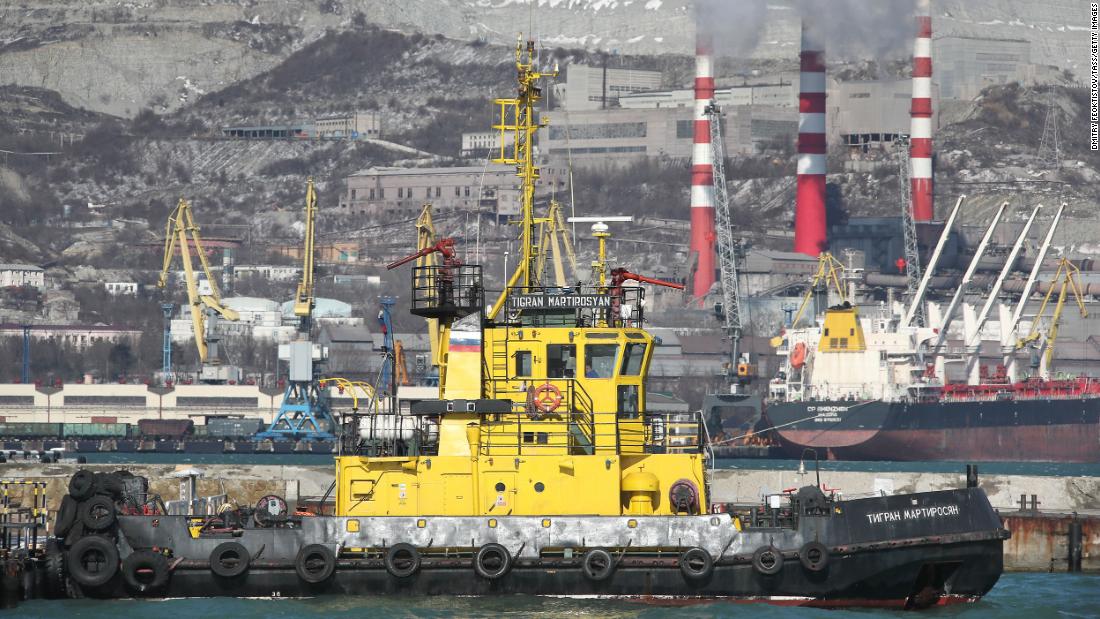
New York (CNN Business)The war in Ukraine is raging. The oil market is panicking.
Russian oil has not been directly targeted by the West's crushing sanctions on Moscow — so far, at least. In fact, the United States and Europe have gone out of their way to avoid hitting Russia's fossil fuels.
But the market is taking no chances when it comes to Russian oil. Traders, shippers, insurance companies and banks don't want to touch the stuff, for fear of running afoul of Western sanctions.
This means that a considerable amount of Russian oil has been effectively sidelined — precisely what the West didn't want to happen. Prices for oil and gasoline have skyrocketed.
"The sanctions have led to a de facto ban on Russian oil," Andy Lipow, president of consulting firm Lipow Oil Associates, told CNN.
Although the West has carved out the energy sector from the crushing sanctions leveled on Russia, the penalties imposed on banks, individuals and Russia's central bank have created a minefield for the energy industry to navigate. And there is concern — some of it sparked by White House comments this week — that Russian oil will be sanctioned eventually anyway.
"How do you know that the oil you are loading has not been tainted by ownership from someone who has been sanctioned?" Lipow said. "You know how you solve that problem? You don't buy it."
'Missing from the market'
Oil supply was failing to keep up with demand long before Russia's invasion of Ukraine last week. The market is in no position to lose any barrels from Russia, the world's No. 2 producer of crude oil last year, yet that is exactly what has happened.
An estimated 4.3 million barrels per day of Russian oil is "missing from the market because Western buyers are refusing to buy it," JPMorgan head of global commodities Natasha Kaneva told Alison Kosik on CNN Business Markets Now Wednesday.
"It's increasingly clear that the Russian [oil] volumes are being ostracized," Kaneva said. "We are experiencing a shortage at the moment."
Gas rapidly moving towards $4
That shortage has rocketed prices higher.
Oil has spiked more than 20% since just before Russia invaded Ukraine. US crude surged as high as $116.57 a barrel Thursday morning — the highest level since September 2008 — before backing off. Brent, the world benchmark, nearly hit $120 a barrel before heading lower.
Gasoline prices also are rising rapidly. The national average for regular gas hit $3.73 a gallon on Thursday, according to AAA, up 7 cents in one week and 19 cents in one month.
And because gasoline prices lag oil prices, they are likely to go even higher in the coming days.
The oil price shock also will drive up the cost of jet fuel, transportation and the countless products made from petroleum. All of this will exacerbate inflation that already stands at a 40-year high.
Banks, tankers and traders step away
Industry analysts point to the de facto ban on Russian oil as a central catalyst behind the latest price spike.
"It's definitely crimping supply — at a time when supply does not need to be crimped," said Tom Kloza, global head of energy analysis for the Oil Price Information Service.
One of the biggest problems is that refiners are refusing to buy Russian oil. Lipow said refiners in the United States, Finland, Sweden and elsewhere are shying away from Russian barrels.
The same situation is playing out with energy trading companies. For example, Lipow said one such company offered a cargo of Russian crude oil for sale — at a huge discount of $18.60 below Brent, instead of the slight discount typically offered before the invasion. There have been no buyers.
At the same time, many banks are declining to provide the financing typically involved in buying oil. Lipow said banks including Credit Suisse, Societe Generale, ING, Rabobank and Bank of China are refusing to extend credit to anyone wanting to finance the purchase of Russian oil.
Some tankers are even refusing to load anything at all at Russian ports or carry Russian oil. The United Kingdom, Canada and other countries have banned Russian tankers.
"No buyers plus no credit plus no tankers equals no Russian oil and higher gasoline and diesel prices," Lipow wrote in a note to clients Thursday.
Will they or won't they?
The swift move away from Russian oil — despite the fact that sanctions have not been directly imposed on it — has caught some on Wall Street and in Washington off guard.
"There was always a possibility that sanctions uncertainty leads to overcompliance. But this has happened with Russian oil beyond what many thought would be the case," said Jason Bordoff, who served as an energy official in the Obama White House.
It's possible buyers of Russian oil might re-emerge if the West clarifies its sanctions stance. That would help ease the supply shortage gripping markets.
"Initially when sanctions come out, no one knows what they mean," said Bordoff, founding director of Columbia University's Center on Global Energy Policy. "Some of the Russian oil sales could come back as people gain a little comfort."
Yet there remains the specter of even tougher sanctions against Russia, with oil being the obvious target.
White House Press Secretary Jen Psaki told CNN's New Day on Wednesday morning that targeting Russian oil exports is "still on the table."
The administration later backtracked. "We don't have a strategic interest in reducing global supply of energy," principal deputy press secretary Karine Jean-Pierre told reporters aboard Air Force One later Wednesday.
Intentional or not, the past few days show that reducing supply has already happened.
"Oil" - Google News
March 04, 2022 at 12:31AM
https://ift.tt/7p0BmCg
Russian oil isn't sanctioned, but nobody wants to touch it anyway - CNN
"Oil" - Google News
https://ift.tt/ynMDm4o
https://ift.tt/YOfjhdr
Bagikan Berita Ini














0 Response to "Russian oil isn't sanctioned, but nobody wants to touch it anyway - CNN"
Post a Comment